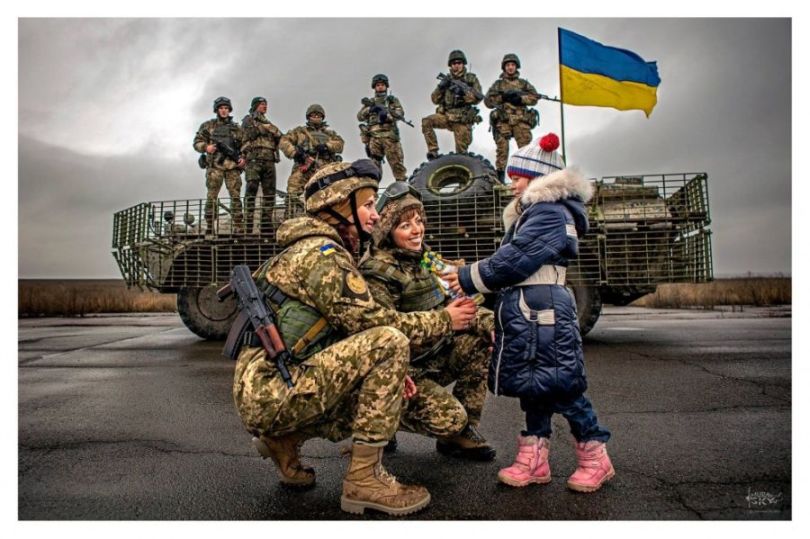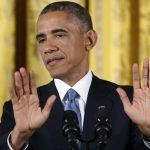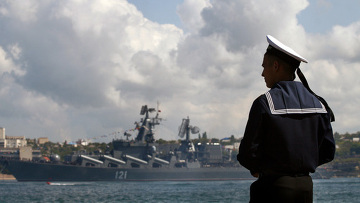Anyone who follows global politics knew (or should have known) what was going to happen in the Ukraine, particularly with the U.S. pushing for full admission of the Ukraine into NATO. Beginning in 1989 with the collapse of the Warsaw Pact, which provided Russia with not just trading partners, but also a military buffer zone separating itself from the NATO and the EU. Many of these countries had been under Russian influence going back to the time of the Czars.
At that time, Russian President Mikhail Gorbachev claims that he had been assured that the West would not exploit the situation, nor would NATO expand to the East, and yet that's exactly what happened. Each admission of a former Warsaw Pact nation into NATO put NATO troops, tanks, artillery, and missiles on Russia's border. Needless to say, the Russians protested but took no military action. But even then they had drawn a line in the sand---no NATO membership for the Ukraine. Not then. Now ever.
Starting in 2013/14 President Obama's Administration began backing groups which were attempting to overthrow the duly elected pro-Moscow candidate Viktur Yanukovych in the Ukraine (the Euromaiden Revolution of 2014). Senator John McCain even went to Kiev to show U.S. support for the ultra right wing Svoboda Party. Victoria Nuland, the assistant Secretary of State for European and Eurasian Affairs, travelled to Kiev on three occasions to show support for Svoboda (and even handed out cookies to the anti-Yanukovych demonstrators!).
It was during this time that Hunter Biden, President Biden's son, was invited to joined the board of directors of Burisma, a Ukrainian energy company (he remained on the board until April 2019). Allegedly, there is an email from Vadym Pozharskyi, an advisor (lobbyist) for Burisma, thanking Hunter for introducing him to his father, who was then vice president under Obama. It's worth noting that Joe Biden, in 2016, called for the dismissal of Ukrainian prosecutor Viktor Shokin, who was investigating charges of alleged corruption of Burisma officers. What business was it of his?
There's no question that Yanukovych was corrupt or that his administration was equally inept. However, that gave the Obama Administration no right to interfere with another country's government (a tried and true tradition of U.S. presidents). Nevertheless, in 2014, Yanukovych was ousted in what amounted to a U.S. supported coup, and a new, pro-Western government led briefly by Oleksander Turchynov was installed, who was followed a few months later by Petro Poroshenko.It was under Poroshenko that the Ukraine began to take a more nationalist agenda. Poroshenko opposed joining NATO, which he felt would "ruin" the country. He also opposed the pro-Russian separatist in the four eastern provinces in the area known as the "Donbas" as unrepresentative of anyone and denounced the mounting reports of genocide. He also opposed nuclear weapons for the Ukraine and encouraged a more decentralized government.
Poroshenko promised to oppose the growing influence of the Ukrainian oligarchs, which had begun their rise in 1991 with the Ukraine's declaration of independence. Unfortunately, corruption had again become a problem (thanks largely to the oligarchs). By 2019, Poroshenko was out and current president (a former actor and comic---the perfect training for a politician), Volodymyr Zelenskyy was in. It should be pointed out that he ran and was elected as an Independent under the banner "Servant of the People".
Zelenskyy promised to end the decades long hostiles with Russia and engage in talks with Putin as soon as possible. At the same time, he sought to end the ongoing situation in the Donbas Region between pro-Russian separatists (with the aid of pro-Russian mercenaries and support from Moscow) and pro-Ukrainian forces, which also include a contingent of neo-Nazi Ukrainians opposed to Russia. However, at the time of Putin's invasion of the Ukraine, Zelenskyy was planning on sending additional troops and supplies eastward to put down the recent increase of activities of the pro-Russian separatists.
In the years preceding the Ukrainian invasion, Putin was on record protesting the expansion of NATO into former Warsaw Pact nations, putting troops, tanks, artillery, and missiles directly on its border. However, while Putin protested and pointed to assurances from various American Presidents that NATO would not move "one centimeter" from its 1989 positions, he did nothing. That is, until 2008, when President George W. Bush began campaigning for the membership of former Soviet Republic, Georgia, into NATO.
In 1991, Georgia declared its independence from Russia. Shortly afterwards, various separatists groups began to fight for control of their own small parts of the country. Some of these were pro-Russian. Georgian officials began a campaign to bring these areas back under control of the Georgian government. Simultaneously, Georgia began to foster a closer economic relationship with the West.This didn't go down well in Moscow. Putin, who had become president of the Russian Federation in May 2000, had warned that a pro-Western position was "not desirable" and NATO membership was unacceptable. Shortly afterwards, Moscow began a crack down on Georgians living in Russia and started applying economic pressure on the tiny country.
By April 2008 the situation had deteriorated to the point where Russian troops invaded Georgia. The fighting lasted until July 2008. In August of 2008, Russia recognized two pro-Russian breakaway states, the Republic of Abkhazia and the Republic of South Ossetia. By the way, Georgia is not or will likely ever be a member of NATO any time soon. Sound familiar?
Putin has been consistent in his demands restricting NATO advancement in regions it considers key to its national security. Take the Crimea for instance. Although the Crimea ceded with the rest of the Ukraine in 1991, it has considered itself a separate region uniquely tied to Russia. It has been under Russian control since Czarina Catherine the Great in 1784. It's been the home of Russia's Black Sea Fleet since 1783 (and its only year around warm water port), plus it provides access to the Mediterranean Sea.
In terms of demographics, 67.9% of the Crimea identifies as Russian, with 15.7% as Ukrainians and 10.6% as Crimean Tatars. The rest is a smattering of Belarusians, Jews, and Armenians. Most, around 58%, belong to the Eastern Orthodox Church. About 15% are Muslims, with the balance not belonging to any specific religion.
In 2014, there was a public referendum in Crimea regarding rejoining the Russian Federation. The referendum had a record turnout of 87% of eligible voters. Of that, 97% voted in favor of reintegration with Russia. In Crimea's largest city (and home of the Black Sea Fleet), Sevastopol, there was a 89% voter turnout and an approval of the referendum by 97%.It's worth noting too that shortly after the Ukraine declared its independence in 1991 (which still included the Crimea), Kiev oligarchs and certain government officials made a deal with several Western oil and gas companies, including Exxon and BP, to tap into the recently discovered oil and gas reserves under the Black and Azov seas. How much oil and gas are we talking about? About 10 billion barrels of oil and 3.8. trillion cubic feet of natural gas worth in the trillions of dollars.
Russian annexation of the Crimea has ensured Russia's economic and energy future for many decades or even centuries to come. Bear in mind too that Europe---that is, the European Union or "EU"---gets about 40% of its oil and gas from Russia. Germany, the EU's economic engine, receives roughly 70%. So all this posturing from NATO in truth means very little. Even the U.S., with its vast oil and gas reserves, imports about 3% of its oil and gas from Russia (this compares to 61% from Canada, 10% from Mexico, and just 6% from Saudi Arabia).
So, what does all this mean? First and foremost, it means whether you like him or hate him, Putin is man of his word. He insisted that there would be no NATO membership for Georgia, and there is none. He also divided up the country the same way he is doing in the Ukraine. He has consistently said no NATO in the Ukraine, and it appears there won't be regardless of the outcome of the war.
Secondly, the Ukraine wasn't the pushover Kremlin strategists predicted it would be. The Ukrainian military has done an amazing job in blunting the Russian advance (even with the use of "vacuum bombs" which vaporizes people and animals) The people of the Ukraine have done a historically remarkable job in standing up to the Russians, be it in terms of fighting or just confronting them face to face. They've shown a level of patriotism and courage the West hasn't witnessed in decades; certainly not in the UK, Germany, France, or the United States.
The Ukraine's ability to impede Russia's state of the art military may also have an impact on the sale of Russian hardware to other countries like China, India, or Iran. Until now, the Russians have done quite well competing against the UK, Germany, France, and the U.S.. Maybe not so much anymore. Additionally, while the West and others have imposed formal and informal sanctions on Russia, it's unlikely to be anything more than symbolic and may negatively impact the West more so.Putin said in a interview by CNN and the BBC on February 25th, that the West (particularly the U.S.) mislead Russia about NATO advancement following the fall of the Warsaw Pact in 1989 and Soviet Russia in 1991. He reiterated his position that there was already too much offensive NATO weaponry, including missiles, on his border. He added that the United States wouldn't stand for the same thing on its border with Canada or Mexico. In short, if Russia can't feel safe, nobody is going to feel safe.
To drive home the point, two long range TU-160 bombers (capable of caring nukes) along with support aircraft, have flown to Venezuela to conduct "joint military maneuvers". In short, he was making a point of possibly stationing long range bombers and even missiles in Venezuela to give America a taste of its own medicine. He has also warned Sweden and Finland to withdraw their requests to join NATO. In light of Georgia and the Ukraine, I would take that "request" very seriously.
The next issue is whether Russian troops will remain or withdraw them following some sort of agreement. In Georgia, he withdrew his troops following the recognition to the two breakaway provinces and permanent withdrawal of the NATO application. Occupying a country is expensive, it ties down troops and equipment, and it's never really secure.
I suspect he will either reach an agreement with Ukrainian President Zelenskyy regarding NATO and formal succession of the four Donbas provinces or he will replace the Zelenskyy Government with a pro-Moscow one, which will agree to those terms. Given the intense resistance of the Ukrainian military and people which would only intensify with a puppet regime, the former option would be the preferred one.
Except for us ageing Babyboomers, most have forgotten about the Cuban Missile Crisis in 1962. As a brief refresher, we caught Russians setting up nuclear capable intermediate SS-4 ballistic missiles in Cuba (In 1959 Castro ousted General Fulgencio Batista, a corrupt U.S. puppet and strongman, from power). The confrontation brought the U.S. and the USSR to the precipice of nuclear war.What the American and Western public didn't know at the time was that we had installed nuclear capable Jupiter intercontinental ballistic missiles in Turkey aimed at Russia in 1961. Russian President Nikita Khrushchev decided that two can play the same deadly game. Eventually, President John Kennedy agreed to withdraw the missiles in Turkey in exchange for removal of the missiles in Cuba and because cooler heads prevailed, we're still here to remember it...and use it as a lesson in the Ukraine.
CATO Institute: America's Ukraine Hypocrisy
Radio Free Europe: Lavrov Claims Obama's Remarks Prove U.S. Backed Ukraine 'Coup'
Crimea oil and gas will not come easy for Russia
Many predicted Nato expansion would lead to war. Thosewarnings were ignored
Russia wants NATO forces out of ex-Warsaw Pact states:Lavrov






No comments:
Post a Comment